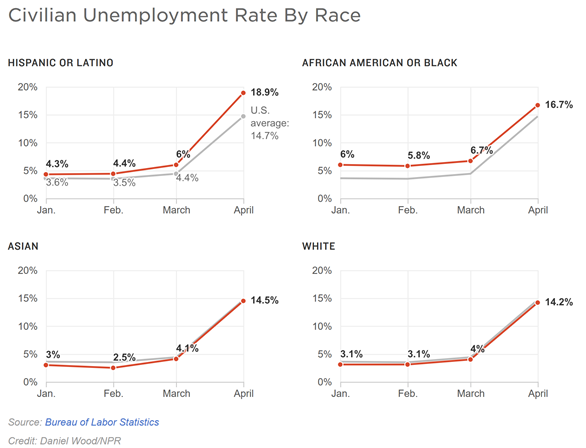Will COVID-19 Drive Hispanics to the Polls?
Hispanic voter turnout has historically been lower than that of non-Hispanic Whites and African Americans. The reasons for this vary from the relative youth of U.S. Hispanics and inconsistent outreach by political parties to a belief among many Latinos that their votes don’t matter. The COVID-19 crisis, however, may be the catalyst that drives change. Hispanics are being affected by COVID-19 disproportionally, both in terms of infections and loss of income. Upheavals of this magnitude are often followed by increased political activism. The Tea Party movement, for example, was launched by the Great Recession while FDR’s New Deal was born from the Great Depression.
Economic Impact
James Carville famously used the phrase “It’s the economy, stupid” to help Bill Clinton unseat George Bush Sr. in 1992. In 2020, it’s still about the economy. According to the Federal Reserve, 20% of Americans lost their jobs in March when the pandemic spurred a nationwide lockdown. However, 40% of people in households with incomes under $40,000 a year lost their jobs during that period. U.S. Hispanics fall into the latter group and are currently experiencing the highest unemployment rate of any racial group.
During the last presidential election, about 30% of Hispanic voters were willing to overlook the President’s anti-immigrant stance in favor of his promise for economic growth. That promise has now been broken, and an economic recovery before the November election looks increasingly difficult.

Health Impact
In parts of the country, Hispanics are infected and hospitalized due to COVID-19 at up to three times the rate of White Americans. Hispanics make up a large proportion of the “essential” workforce, like those working in grocery, agriculture, caretaking, construction, and delivery services. These jobs, unfortunately, cannot be done from a laptop at home. Hispanics, more than any ethnic group, are putting themselves at risk of getting the virus because they have smaller financial cushions and thus have little choice but to continue working. Hispanics also make up a good portion of restaurant and hospitality workers, industries that have seen significant reductions in hours and revenue due to mandatory closures, limited services, or low demand.
Voting impact
African Americans are suffering from similar financial and health outcomes as Hispanics, which may also affect their vote in November. However, they have historically had higher voter turnout than Hispanics (their turnout was higher than Whites in 2012). African American turnout is already expected to be high this year, but an increase in Hispanic voting has the potential to swing several states.
Contrary to what some may believe, low numbers of eligible voters do not cause the disparity in Hispanic voter turnout. Most Hispanics in the U.S. were born here, thus are eligible to vote. But U.S. born Hispanics have lower voter participation than naturalized citizens. According to a survey ThinkNow conducted in February of this year, “disinterest” appears to be the most significant factor depressing turnout.
Achieving voter turnout rates like that of African Americans would cause a seismic shift in American politics. Arizona and Florida voters, for example, voted for Trump in 2016 and have high Hispanic voting populations. For this election season, however, Florida looks especially vulnerable since its vote split was 48.6% to 47.4% in the last presidential election. While conservative Cuban Americans have historically represented Hispanics in Florida, that is changing as Puerto Ricans, Dominicans, Colombians, and Venezuelans move in and increasingly register as Democrats. Even states like Pennsylvania, Wisconsin, and Michigan, which Trump won by a single percentage point or less, can swing back to the blue column if their growing Hispanic populations vote this year.
The second highest reason Hispanics reported not voting was they are “too busy.” But if crushing unemployment numbers and spiking COVID-19 infection rates continue to penalize Hispanics more than other groups, they may find that they do have time, after all, to vote in November in hopes of changing their economic situations.
That would change the face of American politics as we know it.
This blog post was originally published on Medium